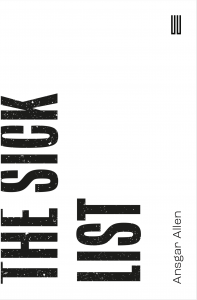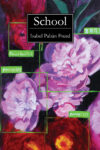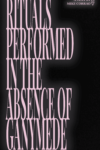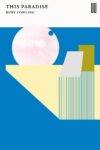
[Boiler House Press; 2021]
To follow the developments in higher learning — or, mercy, to work in academe — is to practice a certain kind of apocalypticism. In the United States, the word “sustainability” has haunted administrative considerations for a decade as universities deal with declining state support, shrinking enrollment markets, and culture-war toxicity. The coronavirus pandemic has exposed these pressures with many university leaders failing spectacularly to establish basic public health protocols, fearing for their revenues more than for the wellbeing of their staff and students. Adjunctification, runaway student debt — basically any higher learning byword is taken to signpost only and directly to the university’s doom.
Ansgar Allen’s academic novella The Sick List provides a timely examination of higher learning’s malaise. Allen skewers the repetition and drudgery that have long plagued intellectual life, framing them in a narrative of decline in which the university itself is the likely culprit. He spears — dare I say it? — the tendency among academics toward cults of personality. And he sets all of this alongside the development of a mysterious illness that spreads across universities, inflicting academics with catatonia.
The Sick List unfolds along two plotlines, set against the backdrop of humanities thinkers at a generic contemporary university in the American west. On one, an unnamed narrator becomes increasingly obsessed with a scholar named Gordon. At times, the narrator describes Gordon as a kind of tutor, though in some passages the narrator seems to think of himself as Gordon’s colleague. (Given the economies of prestige and rank that typify the university, the narrator’s confusion about or indifference to these hierarchies may well be the most practical marker of his unreliability.) Though Gordon never speaks to him, never even takes note of his presence during the course of the narrative, the narrator regards him with the reverent awe of a zealot. The narrator’s relationship to Gordon unfolds through books: the narrator stalks Gordon to see what books he carries along his campus walks, he seeks out copies of these books, ideally those that Gordon himself has underlined and annotated, and he reads them through Gordon’s influence. “The shoe is the sign!,” as they say in Life of Brian. The narrator describes himself as “sick with books” and states — in a flat matter-of-fact tone — that he has “developed this chronic condition through the reading of books read by Gordon.”
When the narrator reads under Gordon’s influence, he is deferential, even sycophantic. His thoughts are captured almost entirely by Gordon’s. Many of these books are studies of waste and entropy, and Allen often provides footnotes to the reading list — for instance to Valerie Allen’s On Farting (2009) or to Dominique Laporte’s History of Shit (1978). Through this waste motif, and through the narrator’s direct reflections, Allen develops a theme about the “death of thought.” The narrator believes that he and Gordon share an intuition that “education must end.” The prospects of thought are so dim, the narrator judges, that he resolves, “The suicide of educated people is the logical destination of educated being.” The narrator perceives the university to be a wasteland of academic potential. Or at least Gordon seems to perceive it as such, and Allen’s narrator is happy to accept the premise.
The second plotline involves the onset of a mysterious illness. It arrives without warning, and it seems to afflict only academics. It begins with scholars found dehydrated and motionless at the university where the narrator and Gordon work. Soon there are reports of similar cases from other universities. Universities respond by setting up psychiatric care facilities, and the narrator’s administration boasts that they created “the most impressive ratio between diminished employees and beds” of all their peers. The narrator’s workplace shifts to an open-office plan so that employees can surveil each other for symptoms. The narrator manages not to contract this illness, though he believes briefly that he has power to inflict it upon others. Because this sickness affects only academics, the reader may perceive a link between the diminished capacities of intellectuals and their higher susceptibility to catatonia, which the narrator labels “the education sickness.”
The Sick List takes place in a single paragraph. This formal device underscores the narrator’s unreliability. His thoughts are somewhat disorganized, recursive, as he tries to decipher whatever it is that Gordon may be trying to communicate to him through his marginalia, as he considers the tie between his obsession with Gordon and the catatonia that is spreading across academe. Allen’s use of the single paragraph also produces a catatonizing effect on the reader: absent the natural cues for a break, the form of the narrative can be numbing.
That numbing effect may capture the academic’s perennial complaints — correcting the same errors for eternity, confronting an email inbox that scrolls eternally, the travails of Sisyphean tenure. But I suspect that it also captures the acute experiences of work and life during the pandemic. If “sustainability” has been the buzzword of the past decade, “burnout” holds a similar pride of place in recent months. While not unique to academe, burnout is a new fixation in think-pieces about professorial and staff careers, as well as those concerned with student success. Like many of my colleagues who tend toward goal-oriented achievement, I have struggled with pandemic fatigue, unable to find even a mite of motivation several times since the onset of the coronavirus. Such burnout arises from different causes than the catatonia that menaces academics in The Sick List, which seems to correlate strongly to “the death of thought.” The remedies in The Sick List, as in our current lived experiences, remain elusive.
“The death of thought” — if The Sick List is an unconventional academic novel for its form, it captures one of the academic novel’s principal tropes here: anti-intellectualism. Anti-intellectualism manifests according to different historical and cultural situations. In the United States, where I work and live, it is reported in Alexis de Tocqueville’s description of the mercantile ethos in Democracy in America (1835), it drives the McCarthyism that typified the midcentury milieu, and it is always at least adjacent to the rightist culture-war fixations that we suffer through today. The Sick List expends much of its space fulminating against formalized intellectualism as an exercise in waste, death, and shit. And not without reason: one is not hard-pressed to think of academic books that seem written mostly for some incidental purpose, usually the author’s promotion, rather than for the sake of genuine knowledge and discovery.
Nevertheless. Framing this anti-intellectualism as a jeremiad, what I detect most in The Sick List is a deep wish for the goods of intellectual exchange. “The university is so diminished and inhibits thought to such an extent, that it even discourages the writing of such awful, thought-inhibiting books” that academics were once known for, the narrator thinks to himself. Identifying the root of this jeremiad, nuanced as it may be with golden-age ideation, and nourishing that implicit desire as a kind of hope for a utopian horizon — this is crucial if an academic wants to be removed from “the sick list” and if the academy intends to persist through its current states of apocalypticism.
Wesley Beal is an associate professor of English at Lyon College, where he teaches American and world literature as well as composition. His current research project is a study of the American campus novel. He is working diligently not to read his name on the sick list.
This post may contain affiliate links.







